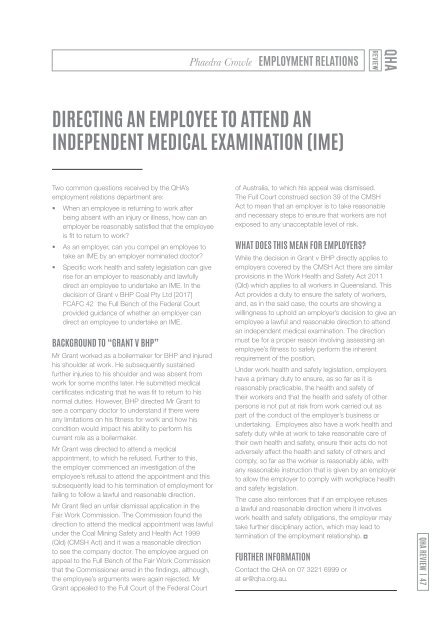QHA Review July 2017
You also want an ePaper? Increase the reach of your titles
YUMPU automatically turns print PDFs into web optimized ePapers that Google loves.
Phaedra Crowle EMPLOYMENT RELATIONS<br />
DIRECTING AN EMPLOYEE TO ATTEND AN<br />
INDEPENDENT MEDICAL EXAMINATION (IME)<br />
Two common questions received by the <strong>QHA</strong>’s<br />
employment relations department are:<br />
• When an employee is returning to work after<br />
being absent with an injury or illness, how can an<br />
employer be reasonably satisfied that the employee<br />
is fit to return to work?<br />
• As an employer, can you compel an employee to<br />
take an IME by an employer nominated doctor?<br />
• Specific work health and safety legislation can give<br />
rise for an employer to reasonably and lawfully<br />
direct an employee to undertake an IME. In the<br />
decision of Grant v BHP Coal Pty Ltd [<strong>2017</strong>]<br />
FCAFC 42 the Full Bench of the Federal Court<br />
provided guidance of whether an employer can<br />
direct an employee to undertake an IME.<br />
BACKGROUND TO “GRANT V BHP”<br />
Mr Grant worked as a boilermaker for BHP and injured<br />
his shoulder at work. He subsequently sustained<br />
further injuries to his shoulder and was absent from<br />
work for some months later. He submitted medical<br />
certificates indicating that he was fit to return to his<br />
normal duties. However, BHP directed Mr Grant to<br />
see a company doctor to understand if there were<br />
any limitations on his fitness for work and how his<br />
condition would impact his ability to perform his<br />
current role as a boilermaker.<br />
Mr Grant was directed to attend a medical<br />
appointment, to which he refused. Further to this,<br />
the employer commenced an investigation of the<br />
employee’s refusal to attend the appointment and this<br />
subsequently lead to his termination of employment for<br />
failing to follow a lawful and reasonable direction.<br />
Mr Grant filed an unfair dismissal application in the<br />
Fair Work Commission. The Commission found the<br />
direction to attend the medical appointment was lawful<br />
under the Coal Mining Safety and Health Act 1999<br />
(Qld) (CMSH Act) and it was a reasonable direction<br />
to see the company doctor. The employee argued on<br />
appeal to the Full Bench of the Fair Work Commission<br />
that the Commissioner erred in the findings, although,<br />
the employee’s arguments were again rejected. Mr<br />
Grant appealed to the Full Court of the Federal Court<br />
of Australia, to which his appeal was dismissed.<br />
The Full Court construed section 39 of the CMSH<br />
Act to mean that an employer is to take reasonable<br />
and necessary steps to ensure that workers are not<br />
exposed to any unacceptable level of risk.<br />
WHAT DOES THIS MEAN FOR EMPLOYERS?<br />
While the decision in Grant v BHP directly applies to<br />
employers covered by the CMSH Act there are similar<br />
provisions in the Work Health and Safety Act 2011<br />
(Qld) which applies to all workers in Queensland. This<br />
Act provides a duty to ensure the safety of workers,<br />
and, as in the said case, the courts are showing a<br />
willingness to uphold an employer’s decision to give an<br />
employee a lawful and reasonable direction to attend<br />
an independent medical examination. The direction<br />
must be for a proper reason involving assessing an<br />
employee’s fitness to safely perform the inherent<br />
requirement of the position.<br />
Under work health and safety legislation, employers<br />
have a primary duty to ensure, as so far as it is<br />
reasonably practicable, the health and safety of<br />
their workers and that the health and safety of other<br />
persons is not put at risk from work carried out as<br />
part of the conduct of the employer’s business or<br />
undertaking. Employees also have a work health and<br />
safety duty while at work to take reasonable care of<br />
their own health and safety, ensure their acts do not<br />
adversely affect the health and safety of others and<br />
comply, so far as the worker is reasonably able, with<br />
any reasonable instruction that is given by an employer<br />
to allow the employer to comply with workplace health<br />
and safety legislation.<br />
The case also reinforces that if an employee refuses<br />
a lawful and reasonable direction where it involves<br />
work health and safety obligations, the employer may<br />
take further disciplinary action, which may lead to<br />
termination of the employment relationship.<br />
FURTHER INFORMATION<br />
Contact the <strong>QHA</strong> on 07 3221 6999 or<br />
at er@qha.org.au.<br />
<strong>QHA</strong> REVIEW | 47

















